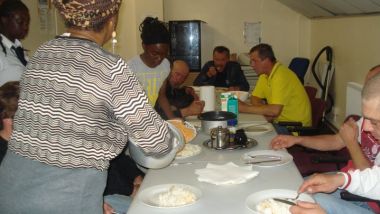
Highway House Church
A church in north London is saving the public purse over £300,000 per year by offering a home to 50 destitute men addicted to drugs or alcohol or suffering mental health problems, according to a new report.
The Highway House church in Tottenham has been running the project for seven years and, according to the Institute for Health and Human Development at the University of East London, for every £1 invested, £5-£8 is returned to society.
Members of the church’s congregation, themselves not generally wealthy and many from immigrant backgrounds, contribute between 10 and 20 per cent of their incomes and raise around £80,000 per year.
According to the institute’s report out today, this saves councils: almost £110,000 a year in temporary accommodation; more than £92,000 in reduced burden on unemployment benefits; over £73,000 on the alleviation on mental health services; almost £25,000 on reduced strain on Accident and Emergency and around £3,500 on reduced crime.
Related
- Britain has a duty to help refugees says Christian human rights lawyer
- Homeless Jesus sculptor: Don’t edit Jesus out of London’s landscape
- Pope Francis to welcome 6,000 homeless pilgrims in Rome
- Charities call for law change to tackle rise in homelessness
Marcia Bravo, a carer with two daughters who earns about £15,000 per year and gives 10 per cent of her salary to the project, told the Guardian:
“Giving so much money goes against human desires,” she said. “My daughters and I have to make sacrifices and it’s not easy. My friends think I’m stupid. There are lots of things I could do with the money I donate every month: take my daughters on holiday, for example. But I can do that later: these men need help now.”
Hannah Adu, who earns £20,000 a year as a self-employed advocate adviser, added: “If I sat down and did a risk or financial analysis, I would never help these men. But then I would never see the transformation: they arrive off the street, completely broken and leave with dignity and hope.”
Hospitals across London, including University College London hospitals, East London and City mental health trust, Guy’s and St Thomas’s and the Royal Free hospital refer men to the church, and police give the church’s address to people in need of help.
The church made space for the men by clearing an area previously used for Sunday school and youth club, with worshippers stacking chairs against its walls after services.


